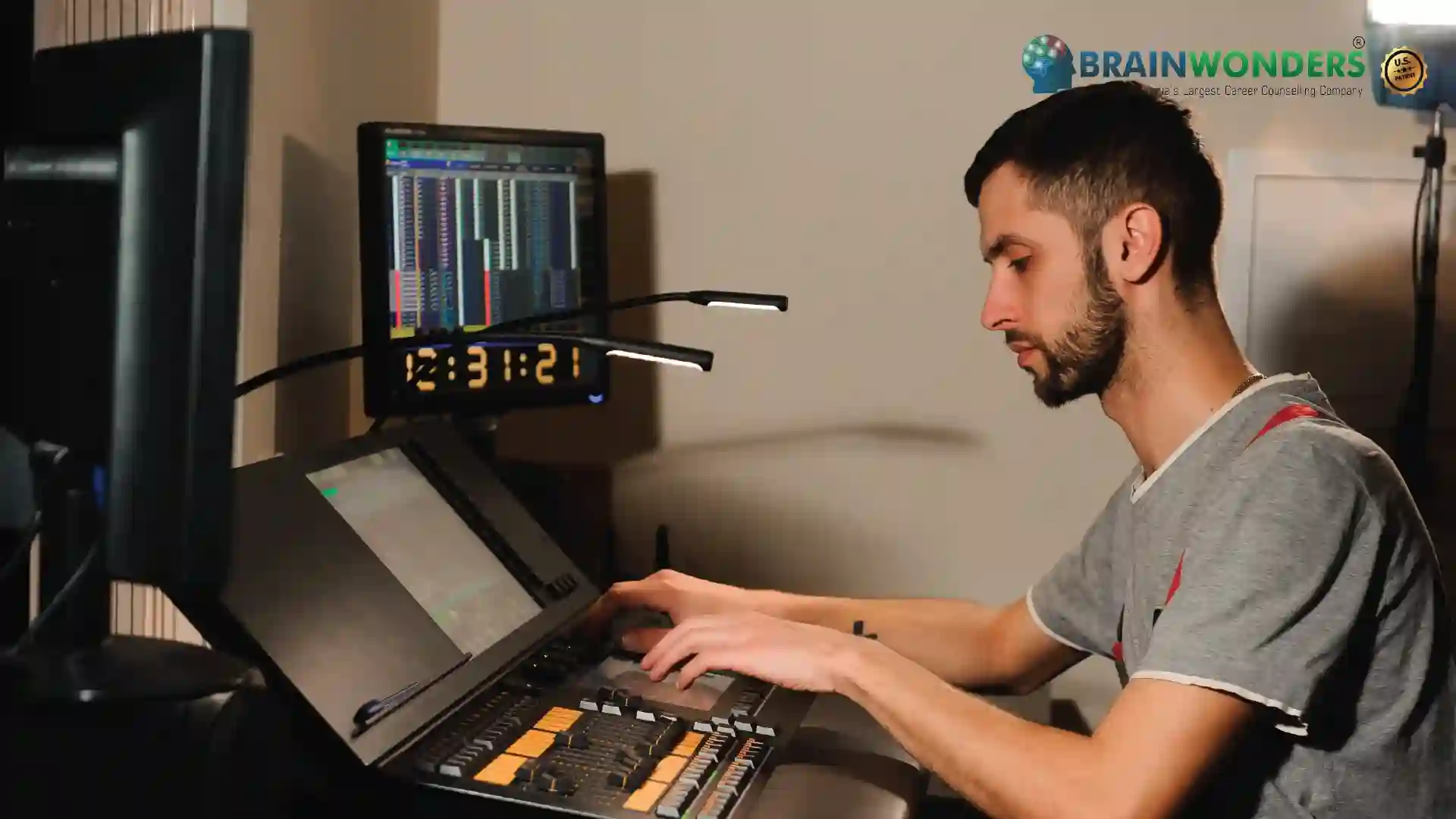How to become an Audio-Visual Specialist
Overview, Courses, Exam, Colleges, Pathways, Salary

Overview
Who is Audio-Visual Specialist ?
Audio- visual (AV) specialists provide maintenance, assembly, and operational duties for a range of audio and visual equipment, including cameras, microphones, lights and sound mixers in order to ensure audio and video presentation is of highest quality. A comprehensive understanding of telecommunications and media, and the dissemination of information are important. These specialists are sometimes referred to as audio visual equipment technicians or audio video specialists.
The work of an audio- visual specialist varies in the wide variety of range to maintain the technical equipment and ensure that they are running smoothly. They also tend to dismantle or disassemble the equipment and the respective machineries when required. It also involves the aspect of using, checking and maintaining the microphones and the sound speakers of those systems (the camera or the radios, etc). These professionals connect the wires and the cables to the entire system that they are working on. Alongside, they also tend to work on the sound system and the boards (mixing boards) pertaining to the video based monitors and their servers included in the entire processing system.
These professionals also tend to work on the relative electronic equipment for various purposes like the live recordings, or the previously recorded sessions or events, for instance, the professional or conference meetings, various small or largely based concerts, the public conferences, meetings and conventions including the podcasts and the presentations. They not only work with the entertainment industry based events, Bollywood or Hollywood industry based conferences or the corporate meetings or conferences, these professionals also work with various news conferences and news based live or recorded information spreading along with the sports events. This is an operational based duty where the audio- visual specialists work on the hardware and the electronic based set-up that are used in any form of recordings.
Typical day at work
What does Audio-Visual Specialist do?
They are often not only in charge of maintaining, troubleshooting, patching, and improving systems, but for choosing the systems that are right for the project in the first place.
- To ensure consistent quality, operate, monitor, and adjust equipment of audio, video, lighting, and broadcast
- For events and live performances set up and take down equipment
- Record speech, music, and other sounds on computers or equipment for recording
- Coordinate sounds with dialogue and action that take place on television or in movie productions
- For the purpose of editing on computers, convert video and audio records to digital formats
- Install, maintain, and repair audio, video, and lighting equipment
- Report problems and make repairs with complex equipment
- Keep records of recordings and equipment used
- Preparing and positioning audio, video and lighting equipment for broadcasts and recordings
- Connect, tune, and configure AV setups to guarantee high-quality broadcast
- Operating software to control AV technologies
- Preparing tele-prompters with scripts
- Monitoring live feeds to ensure quality
- Store and transport AV equipment
- Set up, test, operate, and calibrate AV equipment for live recordings and meetings
- Design and oversee audio visual events
- Make, test, and edit presentations and other multi-format materials
- For set up, connect wires and cables to mixing boards and related electronic equipment to operate sound.
Abilities and Aptitude needed
What are the skills, abilities & aptitude needed to become Audio-Visual Specialist?
Audio- visual specialists require strong technical, troubleshooting, and communication skills. Their technical knowledge let them understand all the technicalities of the processing system of the system. They tend to work around the troubleshoot process that require strong and technical communication skills. These specialists also use systems in the computer to program equipment as well as edit audio and video recordings. Audio- visual specialists also require skills of manual dexterity as they set up audio and visual equipment and cables, a job which requires a steady hand and good eye-hand coordination.
Not only this, these specialists would also require problem-solving skills and creative thinking as technicians need to recognize equipment problems and propose possible solutions to them. This particular profession also requires enough knowledge in computer and electronics based abilities such as thorough knowledge in case of circuit boards, in case of electronic computer software and hardware, their inbuilt chips along with its programing and application processes. These individuals are also advised to be good in their communication skills and media oriented skills like having a good understanding of the media production, knowing the alternative yet other effective methods of communication, entrainment and spreading information, for instance, through the oral or written methods, or through the mime based visual media.
Apart from this, an in- depth knowledge about the field of telecommunications always provides an upper edge to these specialists in their field. This domain naturally helps them in the transmission of the knowledge, the broadcasting capacities or the operational aspects of the telecommunications. Moreover, these individuals are expected to also be good at their fine arts based capacity, for instance, the thorough knowledge about the theory and various techniques in terms of composition, production, sculpturing and the other aspects or works of music like dance, vocals, instrumental recordings, visual based arts or even drama (when it is to be recorded). These are some of the precise and primary based abilities for a audio- visual specialist to have to become the best at his game.
Pathways
How to become an Audio-Visual Specialist?
Entrance Exam
Entrance Exam for Audio-Visual Specialist ?
Courses
Which course I can pursue?
Best Colleges
Which are the best colleges to attend to become an Audio-Visual Specialist?
Industries
Which Industries are open for Audio-Visual Specialist?
- Event Planning and Production
- Broadcasting and Media
- Education and E-Learning
- Corporate Communications
- Entertainment and Live Performances
- Museums and Exhibitions
- Conference and Convention Centers
- Advertising and Marketing
- Hospitality and Tourism
- Government and Public Sector.
internship
Are there internships available for Audio-Visual Specialist?
Yes, internships for aspiring audio-visual specialists are available in various industries that provide hands-on experience in audio-visual production, equipment operation, event support, and multimedia development. Event companies, media organizations, educational institutions, and production studios often offer them to provide practical training and industry exposure to emerging audio-visual specialists.
Career outlook
What does the future look like for Audio-Visual Specialist?
Audio-visual production specialists find employment at businesses with the in-house audio-video production facilities and equipment. Generally the work is indoors, but can include positions outside, in a studio environment in sporting events, concerts and news broadcasts. The work varies from steady 40-hour work weeks to having to work overtime, evening, weekend and holiday shifts, depending on the position and any contractual deadlines. They often work with other AV team members, designers, project managers, installation technicians, and so on.
Since these individuals work in terms of monitoring the equipment & the entire system in both the times, when the system is not in use and when the system is thoroughly working, these specialists require enough focus and activeness to work at things upfront. This aspect also includes the critical thinking of the individuals in processing the things in the immediate capacity and capability.
Along with this capacity, these individuals require the operational thinking and the operational monitoring of their equipment and their continuous smooth work during all the live and back recordings. These individuals also believe in the complex problem solving, as it is one aspect that is considered highly crucial for these individuals. Therefore, this career is considered a highly practical one including a lot of hands- on training wherein the person should be able to be absolutely active in handling both, passive technical problems and immediate crisis situations.
.webp)
.webp)

